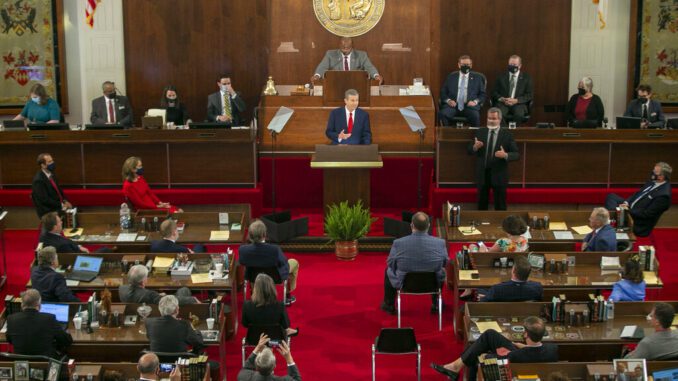
RALEIGH — North Carolina Democratic Gov. Roy Cooper recalled the pain and courage stemming from the COVID-19 pandemic in his State of the State address Monday, while urging Republicans to cooperate with him this year on health care, education and infrastructure needs.
“In a year of hardship and loss, we owe it to ourselves and to each other – and, as leaders, we owe it to the people who elected us – to build a state that is truly more educated, equitable, healthier and prosperous,” Cooper said in a televised speech to a joint session of the General Assembly in the House chamber.
He mourned the deaths of more than 12,500 people from the coronavirus in North Carolina and a pandemic that laid bare “the inequities that were already here” in public schools, high-speed internet and health care access. “But if we can harness all that we have learned from our loss, we can boost opportunities for all,” he added.
“The state of our state is strong. And that’s because the character of our communities is even stronger,” he said during the 33-minute speech.
Cooper’s third State of the State address — and the first since his reelection in November — came as Senate Republicans were just weeks away from passing a two-year budget proposal.
The governor offered a budget plan last month that would spend $27.3 billion next year. He pitched again on Monday night for big teacher raises and K-12 schools spending increases in his proposal, as well as a $4.7 billion bond referendum and expanding Medicaid coverage to hundreds of thousands of adults.
Republicans believe Cooper’s budget spends too much, and Medicaid expansion remains a nonstarter for most GOP members. Cooper’s unwillingness to budge on expansion in 2019 contributed to a budget stalemate that never got fully resolved.
Cooper told Republicans on Monday that it was never a better time to increase Medicaid coverage, citing access to additional federal funds and the increased need for coverage among people thrown out of work during the pandemic.
“Circumstances about Medicaid expansion have changed dramatically since we debated it in the last budget,” he said. “Let’s make a deal. Let’s get this done.”
The governor and Republican leaders have expressed guarded optimism that a budget impasse won’t happen again in the new fiscal year that begins July 1. The executive and legislative branches have worked in a more conciliatory fashion so far this year, particularly on how to spend federal coronavirus relief dollars and a recent compromise to get all schools reopened to in-person learning following a veto from the governor.
Republican majorities in both the House and Senate still aren’t large enough for the GOP to override vetoes on its own. A similar dynamic in 2019 and 2020 meant none of Cooper’s 25 vetoes were overridden.
“There is going to have to be some give and take in order for us to get this done,” Cooper said in a comment directed at Republicans. “I don’t want to have to veto the budget, and I will do my part to see that we have a budget, and I expect you to do yours.”
In a recorded response, House Speaker Tim Moore told viewers that Republicans and Cooper have many similar goals in mind, and GOP legislators will seek as much common ground as possible.
“I am sure that this session of the General Assembly will highlight differences of opinion,” Moore said, citing election rules and criminal justice reform among other issues. “We won’t always agree on the best way to do things, but I assure you that we all agree that we want North Carolina to be the very best it can be.”
Cooper reiterated his call for cooperation hours after he and Republican legislative leaders celebrated North Carolina landing Apple Inc.’s first East Coast campus and 3,000 new jobs over the next decade. The two parties worked on laws in past years to sweeten incentives for companies promising big investment and employment.
“You might have heard today that a little technology company from California has decided to move here,” Cooper quipped.
Cooper lamented the pain caused by racial discrimination across the nation and in the state, particularly over the past week — an indirect reference to a fatal shooting of a Black man as law enforcement in Pasquotank County served warrants.
“We must confront systems that favor some and harm others. And we must fix them,” he said.



